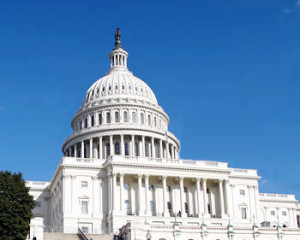Charities Lobby Congress
 With the fiscal cliff looming and cuts on their way nonprofit organizations are descending upon capital hill to defend the charitable deduction tax credit.
With the fiscal cliff looming and cuts on their way nonprofit organizations are descending upon capital hill to defend the charitable deduction tax credit.
Countless charities fear that the charitable deduction may be at risk and argue that cutting this tax credit to their groups they may be harming those that need the services these charities provide the most. By cutting these deductions charitable contributions may dry up effecting those most in need.
“Over the last three years, I’ve never been more worried than I am now, partly because Congress is under enormous pressure to find new sources of revenue,” said senior vice president of United Way, Steve Taylor.
President Obama, who once proposed this sort of deduction, came to their aid arguing that if these deductions were struck from the code or reduced that “every hospital and nonprofit agency across the country would find themselves on the verge of collapse.”
The president is proposing raising taxes on those individuals making $250,000 or more with a lot of pushback from Republicans. Republicans want to eliminate tax breaks and loopholes and keep the tax breaks on the wealthy citing their plan will save $800 billion dollars in tax revenue over the life of the plan.
The GOP remains vague on which deductions they will limit but Obama thinks the charitable deduction may be on the chopping block in their plan.
“There’s been a lot of talk that we can raise $800 billion or $1 trillion in revenues just by cutting loopholes,” Obama said. “But … the only way to do that would be if you completely eliminated, for example, charitable deductions.”
With the fiscal cliff looming both parties seem awash with ideas to curb our deficit and raise revenues.
Nonprofits argue that reduction of this deduction would be “catostrophic” and result in a “real fundamental change in our culture”. Charities receive about $300 billion a year through the act of giving. The deduction tax credit was meant to stimulate charitable contributions and from the looks of that number it looks like it is working.
A CBO report estimated that by eliminating the charitable contribution deduction the government would raise about $230 billion dollars over the next 4 years if giving levels were to remain constant.
The great recession led to dips in the amount of giving declining 7 percent in the last few years for wealthier households.
President Obama proposed capping itemized deductions to 28% of an individuals income down from the 35% it is now. This would obviously hit other deductions as well but charities are real nervous that this reduction will lead to hard times. .
Categories: Tax Law Tags: 501 c 3, charitable deduction, federal income tax, federal tax, income tax, nonprofit tax, tax code, tax reform
House Proposes Fiscal Cliff Counteroffer
 Washington- A ‘Fiscal Cliff’ showdown erupts in Congress on Monday, when a Republican $2.2 trillion budget deficit reduction proposal involved cutting back on federal taxes that the Democrats have been trying to raise.
Washington- A ‘Fiscal Cliff’ showdown erupts in Congress on Monday, when a Republican $2.2 trillion budget deficit reduction proposal involved cutting back on federal taxes that the Democrats have been trying to raise.
The ‘Fiscal Cliff’ will transpire by the end of 2012 and early 2013 when the Budget Control Act of 2011 is set to take effect. Democrats and the Obama administration seek to raise federal tax revenues to $1.6 trillion in 10 years by terminating existing federal tax cuts and increasing federal tax rates- especially the higher income tax brackets of the wealthy.
This proposal is countered with the Republican representatives’ own proposal that plan to raise $800 billion of federal tax revenues not by increasing tax rates but by limiting income tax deductions and cutting down federal tax rates instead. The Republican counteroffer also aims to cut down federal spending by $1.2 trillion in the next 10 years.
The White House calls this counteroffer unbalanced and that it “sticks the middle class with the bill.” A statement from the White House says that the president asks the wealthiest to pay the highest federal taxes because he is unwilling “to compromise on the principles of fairness and balance.”
Meanwhile, several federal tax experts and statesmen have already taken sides on the brewing debate. Senate Minority Leader Mitch McConnell, for instance, believes that the new Republican offer strives to provide a “realistic approach” in solving the country’s economic problems. However, a lot of groups still want a more specific GOP from both parties.
Categories: Federal Tax Tags: federal income tax, federal tax, fiscal cliff, income tax, Republican Tax, tax code, tax reform
‘Fiscal Cliff’ talks still uncertain.
 It’s less than a month before the ‘fiscal cliff’ but the White House and the Congress are yet to reach a common ground.
It’s less than a month before the ‘fiscal cliff’ but the White House and the Congress are yet to reach a common ground.
Last week, the White House delivered a $1.6 trillion proposal that presses for higher federal tax rates on higher income tax brackets- as well as the power for the President to raise the national debt limit- in an effort to tame the effects of the impending year-end fiscal disaster. Republicans were quick to counter the White House plan with their version of ‘fiscal cliff’ proposal submitted to the Congress on Monday. Republicans strongly oppose federal tax rate increase, and instead aims to avert the effects of tax cut expirations and automatic federal tax rate increases by curbing federal spending on benefit programs such as Medicare and Medicaid.
White House and Republican point persons have been busily running around this week- appearing on interviews to reiterate why or why not federal taxes should increase- but there is still very little progress in the negotiations. Based on the current pace of negotiations, an understanding may not be reached until the day before the ‘fiscal cliff.’
The ‘fiscal cliff’ is the term used to refer to the fiscal crisis to be faced by the US government by the end of 2012 due to the concurrent expiration of federal unemployment benefits and the Bush federal tax cuts, as well as the commencement of the Budget Control Act of 2011. Federal tax rates for payrolls will rise from 4.2 to 6.2 percent and taxpayers will have to pay additional federal taxes for Medicare.
Categories: Federal Tax Tags: buffet rule, federal income tax, federal tax, fiscall cliff, income tax, republican, tax code, tax law, tax reform

